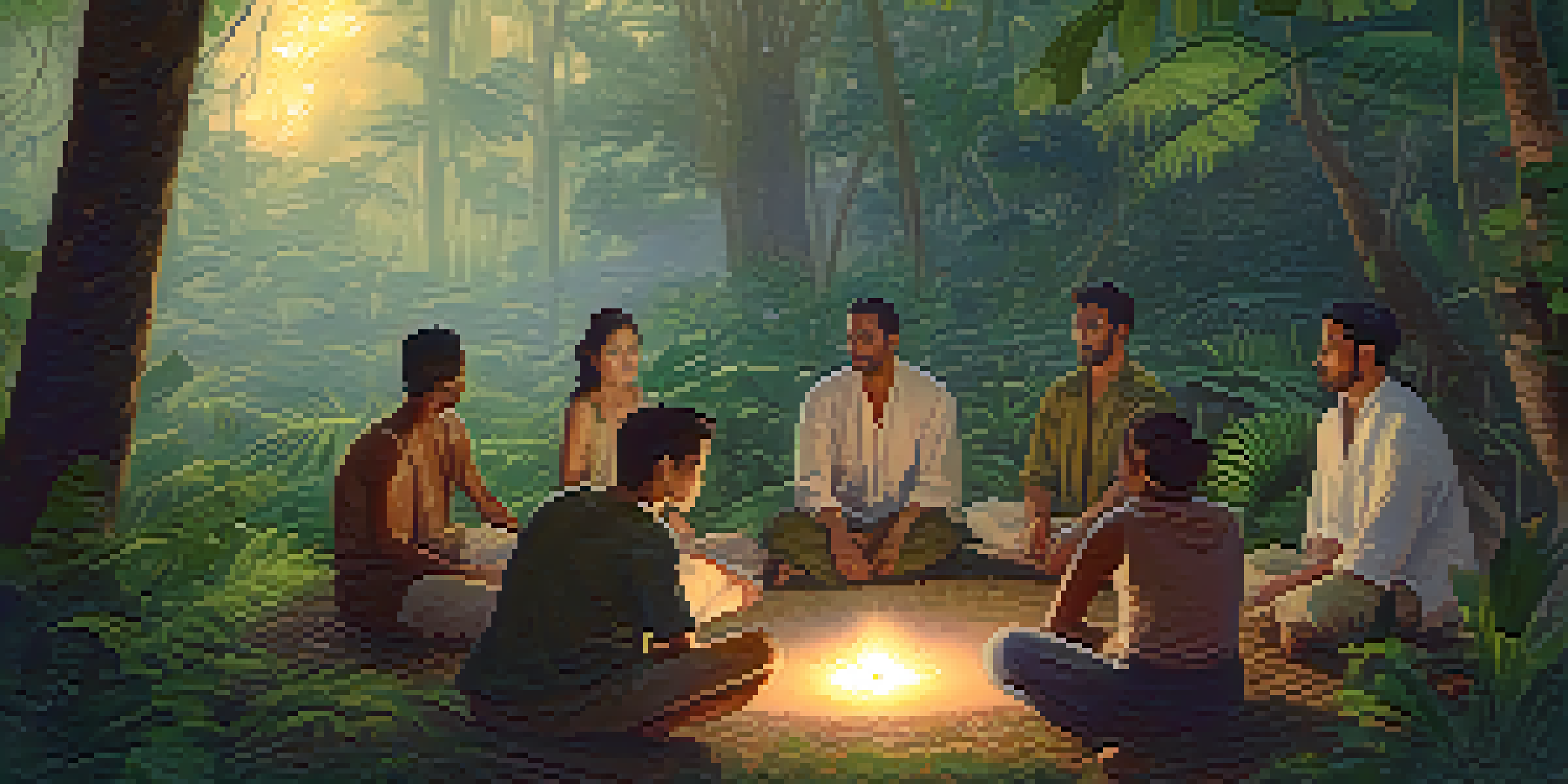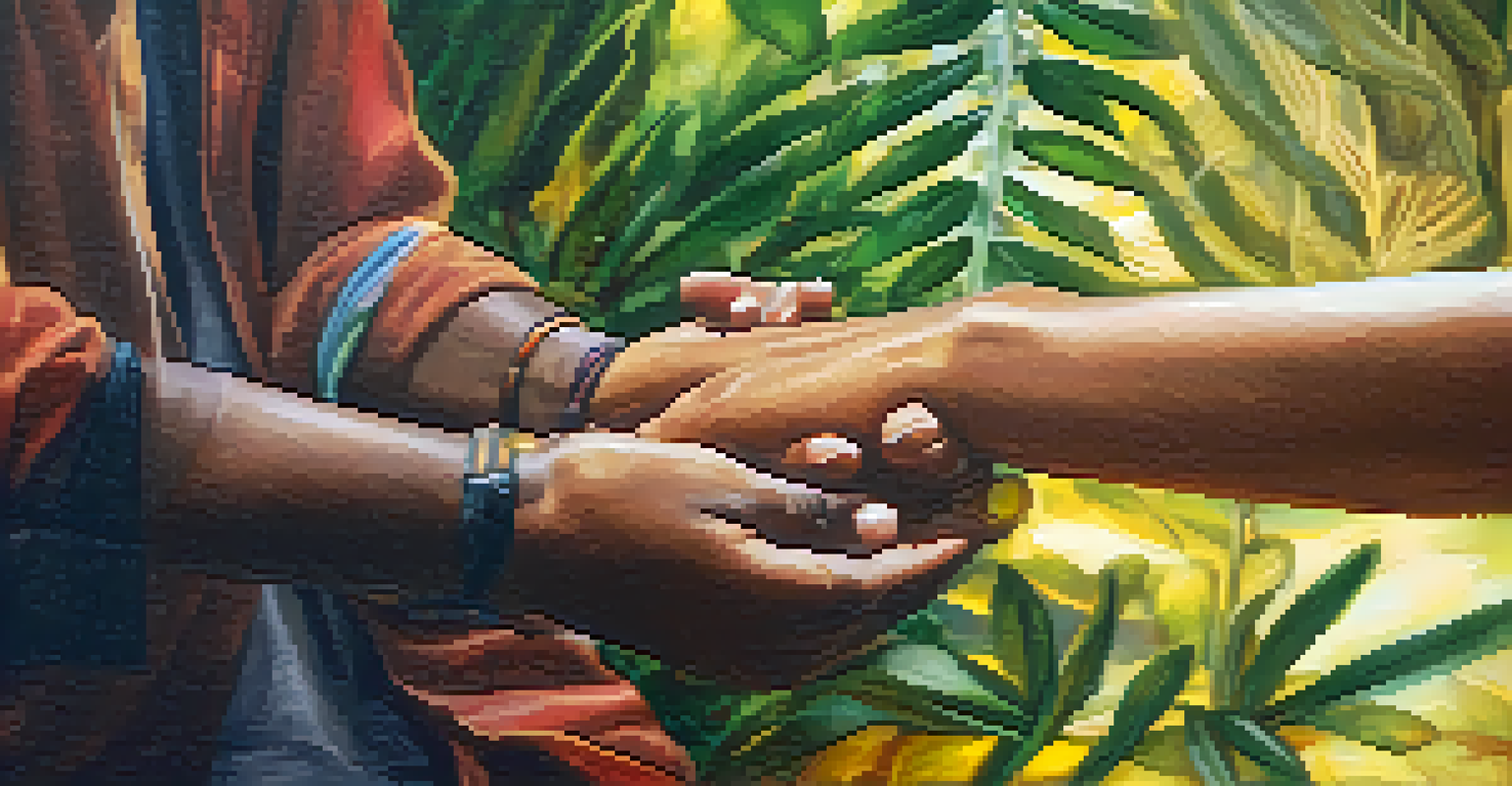The Role of Trust in Ayahuasca-Based Therapy Sessions

Understanding Ayahuasca and Its Therapeutic Potential
Ayahuasca is a powerful plant medicine traditionally used in South American spiritual practices. It contains the psychoactive compound DMT, which can induce profound altered states of consciousness. This experience is often sought for its potential to facilitate healing and personal growth.
The greatest gift you can give someone is your time and attention.
In therapy sessions, participants often seek insight into their personal struggles, traumas, or mental health issues. The journey can be intense and transformative, but its effectiveness greatly depends on the environment and the relationships formed within that space.
Trust plays a pivotal role here, as it creates a safe atmosphere where individuals feel comfortable exploring their innermost thoughts and feelings. Without this foundation, the therapeutic process can become overwhelming and counterproductive.
Building Trust with Facilitators and Guides
Facilitators or shamans leading Ayahuasca sessions are crucial figures in the process. Their experience, knowledge, and approach significantly impact participants' comfort levels. When individuals trust their guides, they are more likely to surrender to the experience and embrace the journey.

Establishing this trust often begins long before the ceremony itself. Pre-session consultations allow participants to ask questions, express concerns, and learn about the facilitator's background. This initial interaction helps to build rapport and lays the groundwork for a trusting relationship.
Trust is Key in Ayahuasca Therapy
Establishing trust with facilitators and within the group is crucial for participants to fully engage and benefit from the Ayahuasca experience.
Moreover, facilitators typically share their own experiences with Ayahuasca, which can further bond them with participants. This openness fosters an atmosphere of safety and connection, making it easier for individuals to delve into their experiences during the ceremony.
Creating a Safe Space for Participants
A safe space is essential for the Ayahuasca experience, as it encourages vulnerability and openness. This environment is cultivated not only through the physical setting but also through the dynamics established between participants and facilitators. Trust is the cornerstone of this safety.
Healing is a matter of time, but it is sometimes also a matter of opportunity.
To create such a space, facilitators often set clear intentions and guidelines at the beginning of the session. This includes reassuring participants that they can express their feelings and boundaries without judgment. Such transparency is vital in nurturing trust.
Furthermore, the presence of other participants can either enhance or hinder this sense of safety. A supportive group dynamic, where individuals feel connected to one another, can significantly bolster trust and promote a more enriching experience.
The Impact of Trust on the Ayahuasca Experience
When trust is established, participants often report deeper insights and more profound emotional releases. This can lead to significant breakthroughs in understanding personal issues and traumas. The experience can transform not just during the session but also in participants' everyday lives.
Conversely, a lack of trust can lead to resistance, fear, or even panic. When individuals feel unsafe, they might struggle to engage with their experiences, which can diminish the therapeutic potential of Ayahuasca. This underscores the importance of fostering trust throughout the process.
Creating Safe Spaces Enhances Healing
A supportive and safe environment fosters vulnerability, enabling participants to explore deep personal issues during their Ayahuasca journey.
Ultimately, the role of trust extends beyond the individual experience; it shapes the collective energy of the group. A trusting environment encourages participants to support one another, fostering a sense of community that can enhance healing.
Trust and Vulnerability: A Delicate Balance
The relationship between trust and vulnerability is intricate, especially in the context of Ayahuasca therapy. Participants must be willing to open themselves up to the experience, which requires a significant level of trust in both the facilitator and the process. This vulnerability is where real healing can occur.
However, it’s important to recognize that not everyone may be ready to embrace this level of vulnerability. Some individuals might feel hesitant or fearful, which can create barriers to building trust. Facilitators play a critical role in guiding participants through this delicate balance.
Creating an environment that encourages gradual exposure to vulnerability can help ease this process. Through gentle encouragement and reassurance, facilitators can help participants recognize their strength and potential for growth.
Trust Beyond the Ceremony: Integration and Support
The journey doesn’t end when the Ayahuasca session concludes. Trust continues to play a vital role in the integration of the experiences gained during the ceremony. Participants often benefit from ongoing support, whether through community groups, therapists, or integrative practices.
Facilitators can help bridge this gap by providing resources and guidance for post-ceremony integration. This can include follow-up meetings, recommended readings, or connecting participants with supportive networks. Maintaining this trust ensures that participants feel supported as they process their experiences.
Ongoing Support for Integration Matters
Trust continues to play a vital role in helping participants integrate their Ayahuasca experiences, emphasizing the importance of post-ceremony support.
Additionally, sharing stories and insights from the ceremony with others can reinforce the bonds of trust formed during the experience. This collective sharing not only aids individual integration but also strengthens the community built around Ayahuasca therapy.
The Future of Trust in Ayahuasca Therapy
As interest in Ayahuasca therapy continues to grow, the importance of trust remains paramount. With an increasing number of facilitators and programs emerging, ensuring a safe and trustworthy environment is crucial for the integrity of the practice. This highlights the need for education and standardization within the field.
Building trust involves ongoing dialogue about best practices, ethical considerations, and participant well-being. This proactive approach can help participants make informed choices about their journey and find facilitators who prioritize their safety and trust.

Ultimately, the future of Ayahuasca therapy hinges on the relationships formed within these spaces. By prioritizing trust, we can enhance the therapeutic potential of Ayahuasca and foster a supportive community that facilitates healing and growth.